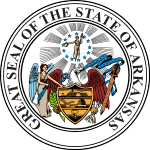| Elections in Arkansas |
|---|
 |
Arkansas Proposed Initiative Act No. 1 (2008) is an initiated state statute that was approved on November 4, 2008, election in Arkansas. This measure makes it illegal for any individuals cohabiting outside of a valid marriage to adopt or provide foster care to minors. While the measure was proposed primarily to prohibit same-sex couples from being adoptive or foster parents, this measure also applies to all otherwise qualified couples who are not legally married. [1]
Contents
On December 30, 2008, the ACLU filed suit in state court on behalf of 29 adults and children, challenging Act 1 as unconstitutional. [2]
On April 16, 2010, the law was overturned by Circuit Court Judge Chris Piazza in the case Arkansas Department of Human Services v. Cole . [3] His ruling was upheld unanimously by the Arkansas Supreme Court on April 7, 2011. [4]
